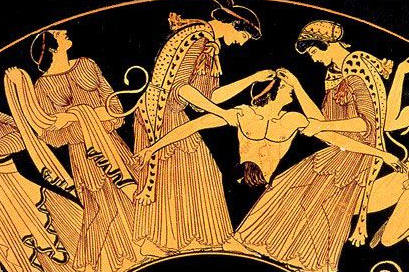|
 Apollonius is aware of the story, and as a Pythagorean, believed it: "Would you then say," said Apollonius, "that as Pythagoras
declared himself to be Euphorbus, so you yourself, before you entered
your present body, were one of the Trojans or Achaeans or someone else?"
(Philostratus, Life of Apollonius of Tyana, Book 3, Chapter 19). He himself claimed to have lived previously
as the captain of an Egyptian vessel: "Iarchas therefore took him up
and said: 'Then you think it ignoble to have been the pilot of an
Egyptian vessel, for I perceive that this is what you were?' 'What
you say,' said Apollonius, 'is true, Iarchas; for that is really
what I was; but I consider this profession not only inglorious but
also detestable. . .'" (Philostratus, Life of Apollonius, Book
3, Chapter 23). Apollonius' first loyalty was to Pythagoras, for whom this
error is foundational; here he confesses himself a disciple of the Samian sage: "'O divine Pythagoras, do thou defend me upon these counts; for we
are put upon our trial for a rule of life of which thou wast the discoverer,
and of which I am the humble partisan.'" (Philostratus, Life of Apollonius,
Book 8, Section 7iv).
Apollonius is aware of the story, and as a Pythagorean, believed it: "Would you then say," said Apollonius, "that as Pythagoras
declared himself to be Euphorbus, so you yourself, before you entered
your present body, were one of the Trojans or Achaeans or someone else?"
(Philostratus, Life of Apollonius of Tyana, Book 3, Chapter 19). He himself claimed to have lived previously
as the captain of an Egyptian vessel: "Iarchas therefore took him up
and said: 'Then you think it ignoble to have been the pilot of an
Egyptian vessel, for I perceive that this is what you were?' 'What
you say,' said Apollonius, 'is true, Iarchas; for that is really
what I was; but I consider this profession not only inglorious but
also detestable. . .'" (Philostratus, Life of Apollonius, Book
3, Chapter 23). Apollonius' first loyalty was to Pythagoras, for whom this
error is foundational; here he confesses himself a disciple of the Samian sage: "'O divine Pythagoras, do thou defend me upon these counts; for we
are put upon our trial for a rule of life of which thou wast the discoverer,
and of which I am the humble partisan.'" (Philostratus, Life of Apollonius,
Book 8, Section 7iv).
One Teacher who, given the opportunity to sign onto this paradigm,
signally refused to do so, is Jesus, who answered the question about the
man born blind this way,
“Now as Jesus passed by, He saw a man who was blind from birth. And His disciples asked Him, saying, “Rabbi, who sinned, this man or his parents, that he was born blind?”
Jesus answered, 'Neither this man nor his parents sinned, but that the works of God should be revealed in him. I must work the works of Him who sent Me while it is day; the night is coming when no one can work. As long as I am in the world, I am the light of the world.'”
(John 9:1-5).
Notice what Jesus refrains from saying: that the man was born
blind in punishment for sins committed during a prior lifetime. This
grossly unfair accusation is flung every day in the East in the
faces of those children unfortunate enough to be born with a
deformity or disability. No doubt this 'blame the victim' mentality
adds to the weight of the burden these children must bear in their
struggles.
Plato is the most widely-read of the ancient authors who endorsed
the Eastern concept of reincarnation. The story is, he got it from
the Pythagoreans, some of whose literature he purchased:
"It is related that Plato the philosopher had a very
small paternal inheritance, notwithstanding which, he bought three
books of Philolaus, the Pythagorean, at the price of ten thousand
denarii; which sum some affirm to have been given him by his
friend Dio, of Syracuse." (Aulus Gellius, Attic Nights, Volume
I, Book III, Chapter XVII, pp. 225-226).
This was a secretive cult whose devotees were sworn to maintain silence for years
upon joining, and there is no evidence Plato ever did that. The books
would have been expensive because devotees were not supposed to share
their esoteric knowledge. Presumably Pythagoras himself
got it direct from the source, from Hindu or Buddhist teachers; this is the normal belief in the East,
it is not the native Greek or Roman belief. This at any rate was Apollonius'
theory: ". . .and of the sages of India, from whom these principles of
wisdom were derived by Pythagoras and his school." (Philostratus,
Apollonius of Tyana, Book 8, Chapter 7.xii.).
The popularity of Philostratus' Life of Apollonius of Tyana is
likely due to the 'New Age' feel of the material, which is a
popular theme nowadays. Apollonius was a Pythagorean and believed in
reincarnation. He was also a vegetarian: "And having said this he
declined to live upon a flesh diet, on the ground that it was unclean,
and also that it made the mind gross; so he partook only of dried fruits
and vegetables, for he said that all the fruits of the earth are clean."
(Philostratus, Life of Apollonius of Tyana, Book 1, Chapter 8). One
motivation to vegetarianism to those of this persuasion may be
summarized as, 'Don't eat Grandma!' He supplemented and deepened
Pythagoras' system by going back to the source.
|
